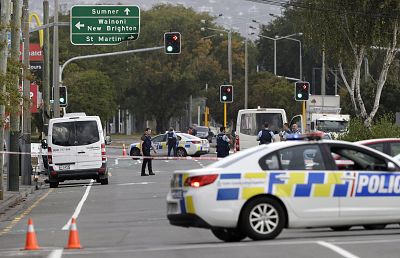Except for a few British publications, most news organizations continued trying to reduce click-bait coverage of terrorists or violent attacks.
In the hours after Friday'smass shooting at two mosques in New Zealand, almost every major news organization decided not to publish clips from a video of the attacks that the accused gunman appeared to have live-streamed.Only a handful of British tabloids and websites did so, and one, The Daily Mail, even published in full a manifesto he apparently wrote before the attack.Those outlets eventually reversed course and unpublished the materials after an outcry from police and politicians, but their initial decision stands in contrast to a movement calling for the media to avoid extensive coverage of the gunmen in such high-profile attacks, particularly as shooters take steps to maximize the media impact of their actions."We are seeing, even on social media, a backlash," said Jaclyn Schildkraut, an associate professor at the State University of New York at Oswego, who has researched mass shootings. "People don't want to see it. There have been some news agencies that have shown restraint, and even now, I haven't seen the shooter's name out as much — but this is still unfolding."
Media and journalism ethics experts who follow mass shooting and terrorist attack coverage told NBC News that it has been encouraging to see outlets recognize when they have crossed a line.Given how quickly the gunman's video spread across the internet on Friday, New Zealand police asked on Twitter that the "extremely distressing footage" not be circulated. The backlash included politicians in the U.K. blasting the exposure as "deeply concerning and irresponsible."
Lloyd Embley, the group editor-in-chief of Reach PLC, which publishes several British newspapers, including the Daily Mirror and Daily Express, tweeted his regret that The Mirror briefly shared the video of the shooting."We should not have carried this," he wrote. "It is not in line with our policy relating to terrorist propaganda videos."A spokesperson for The Daily Mail said the apparent manifesto had been uploaded "in error."Journalists "need to make sure that it's not just click-bait" and can distinguish when a video adds an important layer of understanding, said Bruce Shapiro, the executive director of the Dart Center for Journalism and Trauma, a project of Columbia University's Graduate School of Journalism.Facebook has also removed the video of the attack, and YouTube, where several accounts appeared to have uploaded versions of the video, tweeted early Friday that the company was "working vigilantly to remove any violent footage."Despite the decision by many news organizations to not overtly share either the video or the manifesto, the video — and others like it — still thrived in some corners of social media. That remains a larger problem, Schildkraut said."Unfortunately, there's sort of this cat-and-mouse game going on between people who believe it should be shown, or perhaps they get their jollies out of it, and people who are trying to take it down," she added.Jason Silva, an adjunct professor at John Jay College of Criminal Justice in New York, whose research specializes in media and crime, said the media had done a better job over the past year of re-evaluating their coverage after complaints that past high-profile attacks gave prominence to the attackers, such as the 2013 Boston Marathon bombings (in which one of the attackers was featured on the cover of Rolling Stone), the 2015 church massacre in Charleston, South Carolina, and the 2016 nightclub shooting in Orlando, Florida."Their faces were plastered all over the media, and their names were used incessantly," Silva said. "However, it seems things may be heading in a better direction in the aftermath of Parkland, which did a good job of avoiding attention to the perpetrator, and instead highlighting the victims."Last year's mass shooting at a high school in Parkland, Florida, was a turning point in one way, Silva added, because of the push by the young survivors and gun control advocates to focus on larger issues, like legislation.Shapiro said the hard part for news outlets is balancing the public's right to know with accepting some responsibility in trying not to influence copycats or to sensationalize events.He added that lessons were also learned in the 1999 shooting at Columbine High School in Colorado, where the two shooters were initially reported to have been part of a group of loners — feeding into an incorrect narrative that was picked up by policymakers."So when we propel the stories of these shooters in a rapid ... got-to-beat-the-competition way, we lead the public and policymakers to incorrect information," Shapiro said.Andrew Tyndall, publisher of the Tyndall Report, which tracks TV news coverage by subject, said American cable news networks in general have transitioned more from news to politics in recent years, "so they've lost the reputation of being the place to go when there is breaking news of this sort."That's where social media has filled the void.Silva said the responsible coverage that came out of Parkland has been offset in some ways by the viral and unbridled nature of social media sites where people can more easily share information that is unreliable.Jack Levin, a professor emeritus at Northeastern University in Boston and co-director of the Brudnick Center on Violence and Conflict, stressed that while media consumers do want and deserve information about attackers, it shouldn't eclipse more meaningful storylines."Who are the heroic figures in these situations who can give other people hope?" Levin said. "To immediately focus on the killer, the tragic loss of life and the brutal bloodletting is to give the killer what he wants, and it misunderstands what the audience wants as well."












